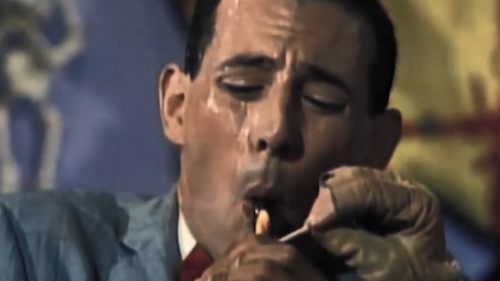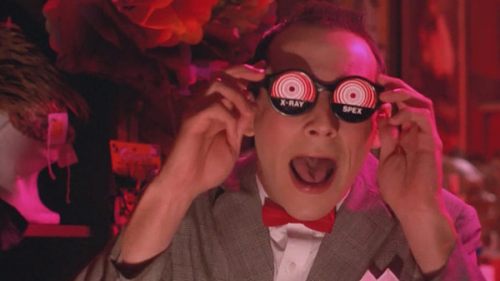Pee-Wee Herman: The Man Who Championed Queer Identities By Not Growing Up
The controversial decision to out Mr. Sulu in this summer's Star Trek Beyond resurfaced recently when Sulu's original portrayer George Takei reported his reaction to the finished film. Takei called it "full of sound and fury, signifying nothing," lamenting that there's "not even a kiss" in the brief scene where Sulu meets his husband and daughter.
Disappointed as Takei was by the restraint of this gesture toward tolerance, he also noted that there was more to constructive queer representation than showing two men kiss. Takei offered a more complex criteria - a character with "their own history," a way of expressing themselves and place in society. It's safe to say that such a character would be distinguished from others by more than who they kiss. To imagine what that might look like, consider Pee-Wee Herman.
Unlike George Takei, Pee-Wee's performer Paul Reubens refuses to discuss his sexuality, and the preferences of his alter ego have been just as ambiguous. His cinematic comeback, Pee-Wee's Big Holiday, turned heads with stronger hints on that subject: in the new movie, Pee-Wee fends off the unwanted advances of a series of women while pursuing a life-changing friendship with Joe Manganiello, who plays himself as a cartoonish paragon of masculinity.
But even more important than those hints is the ambiguity that remains. Joe and Pee-Wee's displays of affection for each other are both curiously extravagant and pointedly innocent. Pee-Wee travels frantically across the country to... attend Manganiello's birthday party. When he arrives, Joe and Pee-Wee... exchange friendship bracelets. It all points to the ways in which Pee-Wee Herman has been challenging assumptions about sexuality throughout his career.
The most obvious given upended by Pee-Wee is that an adult should express sexual preferences, period. At the beginning of Pee-Wee's career, when many people believed that true love could only exist between a man and woman, queer relations were often imperceptible, read as strong but merely platonic bonds. Because opposite-sex relations were often seen as the ultimate form of "adult relationship," queer people who abstained from them could be seen as immature. After all, most boys grow out of finding girls icky. Pee-Wee subverted the expectation that as an adult, he has to love anyone, as Pee-Wee might put it, "the way mommies and daddies do," both in the sense it would be an opposite-sex relationship and that it must involve a standard vocabulary of intimate acts such as kissing.
Pee-Wee took on the big picture, challenging the constructed boundaries of adulthood that affected everyone, queer and otherwise. Far from being isolated from straight and cisgender people in the domain of childhood, Pee-Wee reveled in the whimsy with which he surrounded himself and invited the self-styled "grownups" around him to share in it. Pee-Wee sharing his toys with David Letterman anticipated a re-evaulation of adulthood for everyone, including cultural shifts such as a mainstream appreciation for the artistic merits of cartoons, comic books, toys and video games.
Without definitively revealing the character's sexuality, Paul Reubens created a queer character with his own history, his own way of expressing himself, and his own place in society. Wherever he lives, Pee-Wee is usually a longtime resident, intimately familiar with his neighbors. His homes full of quaint contraptions and relics of childhood and pop culture past further represent his personal history as well as his unique way of expressing himself. They also signify his distinctive place in society: the man with all the toys, a perennial neighborhood kid ever ready to assist or entertain.



